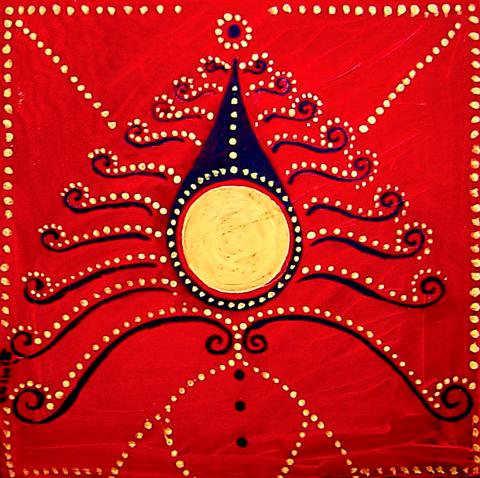The Red Room group has collected a very varied assortment of painters, musicians and other artists from around Taiwan for a day-long event today at Taipei’s Huashan 1914 Creative Park called Artists Beat the Flood 2.
Artists Beat the Flood 2 was launched to help in the building and creation of a shared artistic/creative community in Taiwan. And like the first event, held on Sept. 5, 2009, artists will be painting on site during the day and there will be a silent auction of their works as well as some others that have been donated.
The money raised from the entrance fees and art sale will be used toward event expenses and future events organized by the Red Room, artists, musicians and collaborating parties, participating artist Rohma Mehta told the Taipei Times in an e-mail.

Photo Courtesy of Roma Mehta
Among those who are donating their time and/or works are Taipei-based illustrator Ann Chang, freelance animation director and illustrator JJ Chen, Daniel Desjardins; Charles Haines, poet/painter/jewelry maker Kate Huang (黃莞淑), Constance Woods and self-described “street artist” Joe Fang (方建翔).
The expatriate artists, most of whom are professionals, hail from several countries, including the UK, Croatia, India and Canada.
The event offers visitors a chance to interact with the graphic artists and painters during the creative process and watch how individual works develop.

Photo Courtesy of Aleksandra Tolnauer
However, while the artists will be getting to work early on, starting at 10am, the musical portion of the day does not start until 1pm.
As of press time, the line-up was Almost Irish at 1pm, Josh Drye at 2pm, Future Lands String Quartet at 3pm and the quartet Strawberry Jam Sandwich at 4:30pm. There will be two “unplugged” performances, first by pop rockers Dress Shop at 5:45pm and then Calico (花貓畫國畫) at 7:15pm.
Although the publicity information says the event runs from 10am to 7pm, Calico is not taking the stage until after 7pm, so figure on the show going on at least until 8pm.
COMMUNITY OF ART LOVERS
The Red Room began as Stage Time and Wine@Red Room in November 2009, pulled together by three members of the Mehta family, who were long-term Taipei-based expatriates, architect Leiven Hwang (黃立文), entrepreneur and activist Ping Chu (朱平) and several others, who wanted to create a space where people could share their love of the spoken word, creativity and artistry — as well as some wine and snacks.
While the initial monthly get-togethers focused on sharing poetry and short-story recitations — and some musical contributions — mostly in English, the sessions have evolved and grown more cross-cultural, multi-dimensional and multi-generational, drawing people not just from Taipei, but from around the nation.
Held on the third Saturday of every month, the Red Room is a well-established gathering that regularly packs the second-floor workshop space to capacity. The sign-up book by the door for those who want to share fills up rapidly. It is hard to predict what will be on tap: poetry, a personal memoir, rapping, an interpretive dance, a song on the guzheng (古箏) or liuqin (柳琴).
The creativity unleashed by the Red Room and the camaraderie and networking that are natural by-products have led to some spin-off ventures, including Red Room Radio Redux, which focuses on reader’s theater and radio drama and has done four hour-long drama productions in cooperation with International Community Radio Taipei, and Aside@the Red Room, a curated show. There have also been fundraisers to raise money for Playing for Change, a charity that builds music schools in impoverished areas of Africa and Nepal.

Dissident artist Ai Weiwei’s (艾未未) famous return to the People’s Republic of China (PRC) has been overshadowed by the astonishing news of the latest arrests of senior military figures for “corruption,” but it is an interesting piece of news in its own right, though more for what Ai does not understand than for what he does. Ai simply lacks the reflective understanding that the loneliness and isolation he imagines are “European” are simply the joys of life as an expat. That goes both ways: “I love Taiwan!” say many still wet-behind-the-ears expats here, not realizing what they love is being an

Google unveiled an artificial intelligence tool Wednesday that its scientists said would help unravel the mysteries of the human genome — and could one day lead to new treatments for diseases. The deep learning model AlphaGenome was hailed by outside researchers as a “breakthrough” that would let scientists study and even simulate the roots of difficult-to-treat genetic diseases. While the first complete map of the human genome in 2003 “gave us the book of life, reading it remained a challenge,” Pushmeet Kohli, vice president of research at Google DeepMind, told journalists. “We have the text,” he said, which is a sequence of

Every now and then, even hardcore hikers like to sleep in, leave the heavy gear at home and just enjoy a relaxed half-day stroll in the mountains: no cold, no steep uphills, no pressure to walk a certain distance in a day. In the winter, the mild climate and lower elevations of the forests in Taiwan’s far south offer a number of easy escapes like this. A prime example is the river above Mudan Reservoir (牡丹水庫): with shallow water, gentle current, abundant wildlife and a complete lack of tourists, this walk is accessible to nearly everyone but still feels quite remote.

It’s a bold filmmaking choice to have a countdown clock on the screen for most of your movie. In the best-case scenario for a movie like Mercy, in which a Los Angeles detective has to prove his innocence to an artificial intelligence judge within said time limit, it heightens the tension. Who hasn’t gotten sweaty palms in, say, a Mission: Impossible movie when the bomb is ticking down and Tom Cruise still hasn’t cleared the building? Why not just extend it for the duration? Perhaps in a better movie it might have worked. Sadly in Mercy, it’s an ever-present reminder of just